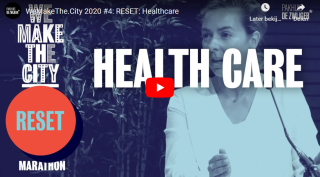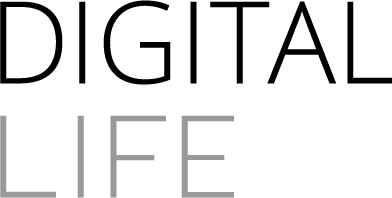Professor Somaya Ben Allouch from Digital Life in LIVECAST WeMakeThe.City 2020
21-09-2020

On Monday September 20. WeMakeThe.City 2020 took place in the form of a 12-hour LIVECAST marathon. Topic of discussion: the uncertain future of our city and metropolitan region. With the theme 'Reset' genius thinking, imagination and creativity came together to formulate alternative visions and perspectives for action. Also the future of healthcare was one of the central themes.
Digitization of healthcare
The reason for this was that Covid-19 suddenly accelerated the digitization of healthcare. Plans for patient contact apps did not get off the ground for years, but were suddenly arranged in a few days. The number of video calling appointments multiplied further and the first 'digital first general practice' opened its doors in September. What does this sudden digital acceleration mean for healthcare? Will remote care - or eHealth - become the new normal? And what does that mean?
Digital Life
Lector Somaya Ben Allouch from our Digital Life research group (DMCI Faculty, Amsterdam University of Applied Sciences) participated in this healthcare debate. Together with three other experts, she discussed the question of what digitization of healthcare means for the healthcare of the future.
Somaya Ben Allouch: "It was striking during the corona period that patients who would benefit from more monitoring - for example during their rehabilitation process - received hardly any attention. In short, from now on we must focus on long-term and sustainable digitization as well as financing. This responsibility lies with all healthcare parties, although the financing system in the Netherlands provides little support. Unfortunately, you cannot reimburse applications from a health insurer, so digital health care interventions - which arise from research - often cannot be financed.'
Technological express train
'Insurers also have difficulty with the speed of technological developments. The gold standard is still RCTs: Randomized Controlled Trials, or randomized trials with a control group. However, technology is developing faster and faster, so that RCTs often lag behind. As a result, these current standards often have an inhibiting effect on research and innovation.'
Another important aspect is: "How do you use technology from the start in such a way that you keep the end user in sight?" This also applies to the corona app. Encourage a people-oriented approach when it comes to digitization of healthcare. Where in the care process can you digitize things in such a way that you do not short on any patient?'
Focus on people
'In this context it also applies that you have to design digital applications from the perspective of a healthcare professional. How does an intervention fit in with someone's working method and the care protocol? And how do we guarantee the human aspect in this? Not every doctor is equally empathetic, while technology can play a supporting role in this. Digitization does not necessarily count as cold and distant. Think of robots that can also make a diagnosis. "Cold technology versus warm care" can move very well together.'
RESET after the corona crisis
Which norms and values should be guiding after the crisis? Somaya Ben Allouch: "Let's argue that we sit down with all kinds of parties as soon as possible to share the knowledge and experience to make healthcare more sustainable. Accessibility of the digital health care system must be broadened - that is one of the pillars of Dutch health care.
As mentioned before, we also need to develop new evaluation strategies and be able to conduct multi-year studies to demonstrate the effectiveness of research. This is the case, for example, in home care: allow the elderly to live independently at home for longer, whereby they are guided remotely in their home situation through monitoring and appropriate care systems.'
Health care of the future
And what to do in the event of the next epidemic? Somaya Ben Allouch: 'Let us stay alert to what we do and use the innovations sustainably to serve as many patients as possible - also during possible subsequent pandemics.'
You can watch the full LIVECAST debate here, enjoy!

